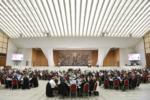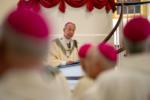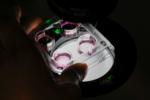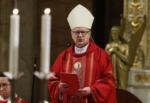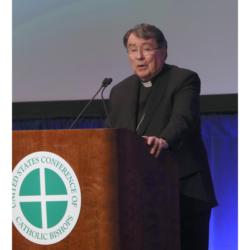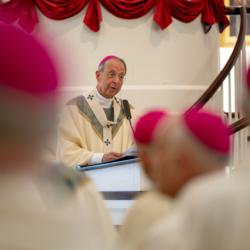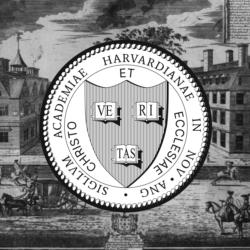The big lesson of the Revival: Treating God as God
Since the end of the National Eucharistic Pilgrimage and the National Eucharistic Congress, I have done several interviews in which the hosts have asked, in one way or another, "What is the single most important thing the Church in the U.S. needs to do to keep advancing the Eucharistic Revival?"
We Americans are a very practical people always searching for simple and straightforward solutions even to the most complex problems.
Fully reviving the Church's Eucharistic knowledge, faith, amazement, gratitude, love, and life will of course involve more than one item.
The U.S. Bishops have indicated four essential things that have to be done: reinvigorate the way Mass is celebrated in the 17,000 parishes in the U.S., give much greater attention to encountering Jesus in Eucharistic adoration, pass on our Eucharistic faith far more effectively in religious education, and zealously share our Eucharistic faith, and the life of charity to which it leads, one-on-one with all those who need the Eucharistic Lord in their life just as much as we do.
But each of those pillars is already at a high level of synthesis: for example, adequately revitalizing the celebration of the sacred liturgy demands several reforms concerning the reverence of the ministers, the full, active and devout participation of the faithful, the beauty of art, architecture, music, prayers, and homilies, and the way we receive the Lord Jesus in holy Communion.
To acknowledge that there are multiple things that need to be done, however, is not to evade the valid question: what is the single most important thing that needs to be done to advance the aims of the Eucharistic Revival?
I think the answer to that question is: to treat God as God.
The Catholic Church professes that the Eucharist is the same Jesus Christ who was once in Mary's womb, held in Joseph's arms, and worshipped by the angels, shepherds, and wise men. The same Jesus who was baptized by John the Baptist, called the apostles from their boats and tax tables, preached, taught, healed, exorcised, fed, forgave, and raised three from the dead. The same Jesus who was betrayed, framed, tortured, crucified, died, rose, and ascended. In his sacramental presence, he obviously looks different, but it's the same Jesus, risen from the dead, body, blood, soul, and divinity.
So, the way we should treat the Eucharistic Jesus today is the way Mary and Joseph, Simeon and Anna, Peter and John, Martha, Mary and Lazarus, the other disciples and apostles treated him 2,000 years ago in his physical presence.
It's fascinating to me to pray about how the Blessed Mother would have prepared to receive her Son Jesus, the blessed Fruit of her womb, within her once again in the Masses celebrated by John, Peter, and the other apostles in the post-Ascension early Church.
Or to ponder what it would have been like for Mary Magdalene, who tried to cling to Jesus' risen feet the day of his Resurrection when He met her in the Garden, to be gripped by him on the inside after receiving him within in Holy Communion.
Or to meditate on what Peter would have felt embracing in his hands the same Jesus who once held him above the surging waves after Peter had begun to sink into the Sea of Galilee.
The love, amazement and reverence with which they would have treated Jesus is the way we should strive to do so today.
I think the biggest reason why we need the Revival is that most Catholics, including those who fully believe what the Church teaches, at a practical level treat the Eucharist as a thing -- a super holy thing, perhaps, but a thing -- rather than as a person.
And not just any person, but the Second Person of the Blessed Trinity, the eternal Son of God, the One through whom all things were made, the Savior of the World and the One who will come to judge the living and the dead.
If we really believed the Eucharist is Jesus Christ, and truly love him, how could we not want to come to receive him within every day? Could we ever imagine a circumstance in which the Blessed Mother, on any given day, would prioritize other things than receiving her Son anew within?
If we really believed the Eucharist is Jesus Christ, and truly love him, would we not want to come to spend time with him in the one-on-one, heart-to-heart conversation that is Eucharistic adoration?
Would we not zealously want to bring others to meet him, be loved by him, become his friends and followers, and have the similar awesome privilege to receive God within them?
Would we not be fired up to take him out to the world he redeemed in Eucharistic processions, walking with him just like the first apostles and disciples accompanied him through Jerusalem and Jericho, Judea, Samaria and Galilee, and beyond?
Would we not want to spend our life imitating his Eucharistic humility and kenosis, making our life a commentary on the words of consecration, as we seek to give our body, blood, sweat, tears, callouses, time and resources out of love for others?
Everything for me, therefore, begins with treating God as God, and behaving toward the Eucharistic Jesus the way we would have treated him in his physical presence 2,000 years ago if we were alive, the way the saints of the Gospel actually did.
It's not enough that, eventually, 100 percent of Catholics will be able to affirm the Church's teaching on the miracle of transubstantiation in a multiple-choice test. For the Revival to succeed, such knowledge must descend from the head to the heart to the knees. It has to be translated into Eucharistic love and action, flowing on Eucharistic knowledge and faith.
Once that happens, then many of the issues that have led to the urgent need for a Revival will begin to fade.
Like the liturgical sloppiness and irreverence that so many faithful sadly still have to endure in different churches.
Like the linguistic carelessness that regularly refers to "consecrated bread and wine" when there's no bread and wine left at all, just the appearances, or that has us sing heretical songs like "look beyond the bread you eat" or catechetically harmful ones like "eat this bread, drink this cup" when, contrary to the mantras, we're not eating any bread at all and certainly not imbibing receptacles.
Like the bewildering statements from some leading churchmen who suggest that the focus of the Mass is not God but the worshipping community, or who complain that there's too much emphasis on Eucharistic adoration or processions, as if adoration doesn't involve time with Jesus himself or processions are not public celebrations of the very Lord who redeemed and called them, or as if such practices are merely vestiges of some toxic pre-Vatican II piety rather the logical, perennial expressions of the Church's faith and love.
The Eucharistic Revival of the Church in the United States, which is essential for the thorough reform of the Church as a whole, will indeed have to involve improvements in many areas. But if we're looking for one thing that should inspire everything, it's to treat Jesus as Jesus.
And once we recognize that the Son of God and Son of Mary is indeed with us always, just as he promised, by means of the Holy Eucharist, then we will take courage to persevere through all of the other necessary parts of the Revival and ecclesial reform, because we know that we don't face those challenges alone.
- Father Landry is a priest of the Diocese of Fall River who is national chaplain to Aid to the Church in Need USA, a Papal Missionary of Mercy and a Missionary of the Eucharist for the US Bishops.


